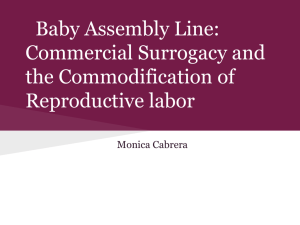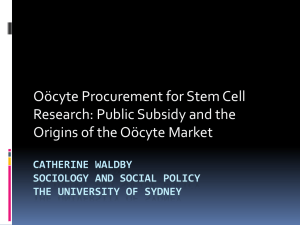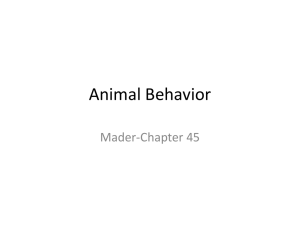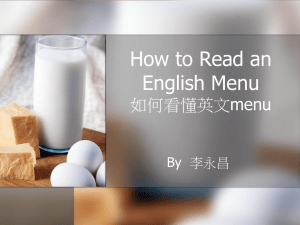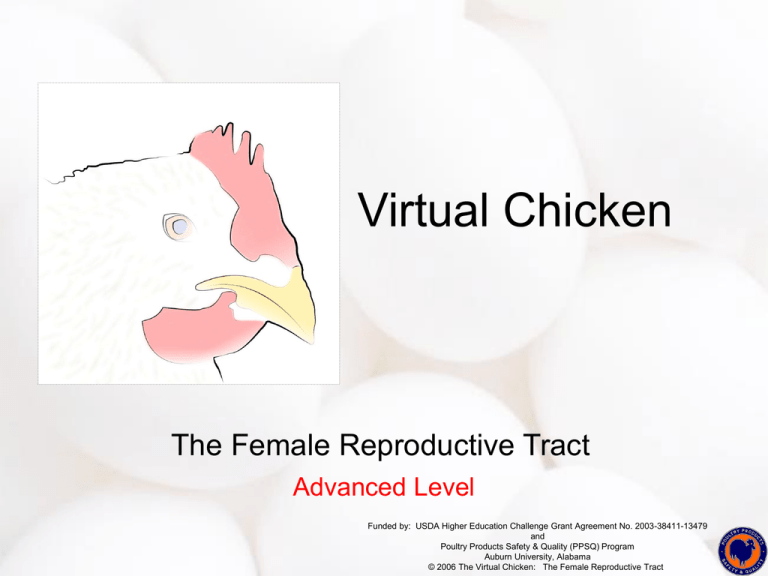
Virtual Chicken
The Female Reproductive Tract
Advanced Level
Funded by: USDA Higher Education Challenge Grant Agreement No. 2003-38411-13479
and
Poultry Products Safety & Quality (PPSQ) Program
Auburn University, Alabama
© 2006 The Virtual Chicken: The Female Reproductive Tract
Virtual Chicken
The Female Reproductive Tract
Role of the Avian Female
Reproductive Tract
Manufacture ova and egg components
• Ova
• Yolk
• Albumen
• Shell
Site of fetilization
Sperm is stored and transported within the
female tract
Funded by: USDA Higher Education Challenge Grant Agreement No. 2003-38411-13479
and
Poultry Products Safety & Quality (PPSQ) Program
Auburn University, Alabama
© 2006 The Virtual Chicken: The Female Reproductive Tract
Virtual Chicken
The Female Reproductive Tract
Ovary -- 2 functions
Produce ova
• germinal disk - will
become the embryo
when fertilized
• Yolk-nutrition for the
growing embryo
Endocrine function
• Estrogen, androgens,
and progesterone
Oviduct
Transport
Packaging
Funded by: USDA Higher Education Challenge Grant Agreement No. 2003-38411-13479
and
Poultry Products Safety & Quality (PPSQ) Program
Auburn University, Alabama
© 2006 The Virtual Chicken: The Female Reproductive Tract
Virtual Chicken
The Female Reproductive Tract
Ovary Structure
Outer cortex contain the
ovarian follicles
• >12000 follicles
– Oocytes
– Steroid producing
cell layers
» Granulosa
» Theca
Inner Medulla
Funded by: USDA Higher Education Challenge Grant Agreement No. 2003-38411-13479
and
Poultry Products Safety & Quality (PPSQ) Program
Auburn University, Alabama
© 2006 The Virtual Chicken: The Female Reproductive Tract
Virtual Chicken
The Female Reproductive Tract
Ovarian Follicle
Funded by: USDA Higher Education Challenge Grant Agreement No. 2003-38411-13479
and
Poultry Products Safety & Quality (PPSQ) Program
Auburn University, Alabama
© 2006 The Virtual Chicken: The Female Reproductive Tract
Virtual Chicken
The Female Reproductive Tract
Time ova spends in each section
Infundibulum
≤ 1 hour
Captures ova
Secretes outer membrane
First albumen
Magnum
2 – 3 hours
Albumen
± 1 hour
Inner
Outer Shell Membranes
Shell gland
Avidin
Ovalbumin
Lysozyme
Isthmus
Oviduct
Fast Facts
20 – 26 hours
Plumping
Shell deposition
Vagina
Just a few minutes
Sperm storage
Cuticle
Pigment
Funded by: USDA Higher Education Challenge Grant Agreement No. 2003-38411-13479
and
Poultry Products Safety & Quality (PPSQ) Program
Auburn University, Alabama
© 2006 The Virtual Chicken: The Female Reproductive Tract
Virtual Chicken
The Female Reproductive Tract
Embryonic Origin of the Ovary
Before hatching, the embryo is in an “indifferent”
stage having the beginnings of both male and female
reproductive organs.
Primordial germ cells (PGC’s) that will become eggs or
sperm have formed in the embryo before oviposition.
PGC’s circulate in the blood
Migrate into the mesoderm and colonize “gonadal ridge”
96 hours into incubation: PGC’s migrate to left side if the
embryo is genetically female
Eventually forms the ovary
Funded by: USDA Higher Education Challenge Grant Agreement No. 2003-38411-13479
and
Poultry Products Safety & Quality (PPSQ) Program
Auburn University, Alabama
© 2006 The Virtual Chicken: The Female Reproductive Tract
Virtual Chicken
The Female Reproductive Tract
Development of the Ovary
Cortex – outer cell layers of embryonic ovary
Medulla-inner cell layers
Proliferation of PGCs
Right ovary stops developing and degenerates
PCGs and connective tissue
First sex specific differentiation is thickening of the cortex at 7 days of age
PGCs
Some medullary tissue may persist in right oviduct
Can form ovotestis if the ovary ever becomes damaged
Left ovary continues to develop
Funded by: USDA Higher Education Challenge Grant Agreement No. 2003-38411-13479
and
Poultry Products Safety & Quality (PPSQ) Program
Auburn University, Alabama
© 2006 The Virtual Chicken: The Female Reproductive Tract
Virtual Chicken
The Female Reproductive Tract
Oviduct
Embryo has both male (Wolfian) and
female (Mullerian) reproductive duct
system.
Mullerian duct becomes the Oviduct
Wolfian duct may persist as a vestigial
structure
Funded by: USDA Higher Education Challenge Grant Agreement No. 2003-38411-13479
and
Poultry Products Safety & Quality (PPSQ) Program
Auburn University, Alabama
© 2006 The Virtual Chicken: The Female Reproductive Tract
Virtual Chicken
The Female Reproductive Tract
Funded by: USDA Higher Education Challenge Grant Agreement No. 2003-38411-13479
and
Poultry Products Safety & Quality (PPSQ) Program
Auburn University, Alabama
© 2006 The Virtual Chicken: The Female Reproductive Tract
Virtual Chicken
The Female Reproductive Tract
Yolk Formation and Maturation of the Ovum
White yolk
Core of the yolk
Female pronucleus (female genetic material)
Yellow yolk
Deposited in layers on white yolk
Yellow because of fat soluble pigments from feed
Female pronucleus rises through yellow yolk on stalk
Funded by: USDA Higher Education Challenge Grant Agreement No. 2003-38411-13479
and
Poultry Products Safety & Quality (PPSQ) Program
Auburn University, Alabama
© 2006 The Virtual Chicken: The Female Reproductive Tract
Virtual Chicken
The Female Reproductive Tract
Yolk Formation and Maturation of the Ovum
Rapid deposition of yellow yolk for 7-10 days prior to ovulation
Yolk material is formed as droplets or spheres much like fat
droplets in milk.
Yolk formation is estrogen dependent
Yolk components formed in liver
Particles of “Very Low Density Lipoproteins” (VLDL)
12% protein
88% lipid
Funded by: USDA Higher Education Challenge Grant Agreement No. 2003-38411-13479
and
Poultry Products Safety & Quality (PPSQ) Program
Auburn University, Alabama
© 2006 The Virtual Chicken: The Female Reproductive Tract
Virtual Chicken
The Female Reproductive Tract
Yolk Formation and Maturation of the Ovum
Proteins
Apo-B, Apo-VLDL-II
Vitellogenin
Phosvitin, Lipovitellin
Plasma proteins
Albumin
IgG (antibodies to protect chick)
Funded by: USDA Higher Education Challenge Grant Agreement No. 2003-38411-13479
and
Poultry Products Safety & Quality (PPSQ) Program
Auburn University, Alabama
© 2006 The Virtual Chicken: The Female Reproductive Tract
Virtual Chicken
The Female Reproductive Tract
Yolk Formation and Maturation of the Ovum
Lipids
Triglycerides (70 – 75%)
Can be somewhat
manipulated by changing
hen’s diet
Mainly palmitic, oleic acids
Phospholipids (20-25%)
Cholesterol (only 4%!)
Funded by: USDA Higher Education Challenge Grant Agreement No. 2003-38411-13479
and
Poultry Products Safety & Quality (PPSQ) Program
Auburn University, Alabama
© 2006 The Virtual Chicken: The Female Reproductive Tract
Virtual Chicken
The Female Reproductive Tract
Yolk Formation and Maturation of the Ovum
4 membranes enclose the
yolk (from inside to out)
Vitelline membrane
Perivitelline membrane
Middle continuous layer
Extravitelline layer
Blastodisc
Location of the embryo
Floats on white yolk
Funded by: USDA Higher Education Challenge Grant Agreement No. 2003-38411-13479
and
Poultry Products Safety & Quality (PPSQ) Program
Auburn University, Alabama
© 2006 The Virtual Chicken: The Female Reproductive Tract
Virtual Chicken
The Female Reproductive Tract
Follicular Hierarchy
Follicles develop in an orderly
hierarchy
Control of the order of follicle
development is not well understood
Recruitment of follicles into the
hierarchy:
May be adrenal regulated
The Adrenal glands are essentially
embedded in ovary
Nerve endings on thecal cells
If nerves are cut: many follicles mature
at once
Funded by: USDA Higher Education Challenge Grant Agreement No. 2003-38411-13479
and
Poultry Products Safety & Quality (PPSQ) Program
Auburn University, Alabama
© 2006 The Virtual Chicken: The Female Reproductive Tract
Virtual Chicken
The Female Reproductive Tract
Hormone production
by follicles
Steroidogenesis: Controlled by pituitary hormones:
FSH and LH
Estrogen and androgen
Estrogen production dominates as the follicle
begins to accumulate yolk then declines as follicle
nears maturation
Androgen and progesterone production maximum
about 3 days prior to ovulation
Androgen production ends at just before ovulation
Progesterone production continues after ovulation
Funded by: USDA Higher Education Challenge Grant Agreement No. 2003-38411-13479
and
Poultry Products Safety & Quality (PPSQ) Program
Auburn University, Alabama
© 2006 The Virtual Chicken: The Female Reproductive Tract
Virtual Chicken
The Female Reproductive Tract
Endocrine Control of Development
Follicle stimulating hormone (FSH)
Granulosa cell differentiation
Progesterone production
Luteinizing hormone (LH)
Androgens
Estrogens
Funded by: USDA Higher Education Challenge Grant Agreement No. 2003-38411-13479
and
Poultry Products Safety & Quality (PPSQ) Program
Auburn University, Alabama
© 2006 The Virtual Chicken: The Female Reproductive Tract
Virtual Chicken
The Female Reproductive Tract
Post Ovulatory Follicle
In mammals, the parts of the follicle
remaining after ovulation become the “corpus
luteum” and continues to produce
progesterone to support pregnancy
In birds, steroidogenic capacity is retained by
the postovulatory follicle for 24 hours
Probably has no function since birds don’t get
pregnant
Gone by 6 days
Funded by: USDA Higher Education Challenge Grant Agreement No. 2003-38411-13479
and
Poultry Products Safety & Quality (PPSQ) Program
Auburn University, Alabama
© 2006 The Virtual Chicken: The Female Reproductive Tract
Virtual Chicken
The Female Reproductive Tract
Ovulatory Cycle
Interval between consecutive ovulations
Controlled by circadian rhythms
Clock reset at dusk: open period for oviposition begins 15
hours after dusk
Open period: Oviposition and ovulations occur during
an 8 hour period
Ovulation 30 – 45 minutes after oviposition
LH release controls ovulation
Funded by: USDA Higher Education Challenge Grant Agreement No. 2003-38411-13479
and
Poultry Products Safety & Quality (PPSQ) Program
Auburn University, Alabama
© 2006 The Virtual Chicken: The Female Reproductive Tract
Virtual Chicken
The Female Reproductive Tract
Ovulation
Structure of the follicle causes
expulsion of the ovum
Stigma: avascular area
Collagen structure weaker
Proteolytic enzymes -digest
and weaken the membranes
Myofibrils - contract and cause
the membranes to rupture
Funded by: USDA Higher Education Challenge Grant Agreement No. 2003-38411-13479
and
Poultry Products Safety & Quality (PPSQ) Program
Auburn University, Alabama
© 2006 The Virtual Chicken: The Female Reproductive Tract
Virtual Chicken
The Female Reproductive Tract
Functions of the Egg
Container
Holds and protects the organic and
inorganic materials required to
produce the chick
Controlled environment
Controls entry of microorganisms,
gas exchange, moisture loss
Funded by: USDA Higher Education Challenge Grant Agreement No. 2003-38411-13479
and
Poultry Products Safety & Quality (PPSQ) Program
Auburn University, Alabama
© 2006 The Virtual Chicken: The Female Reproductive Tract
Virtual Chicken
The Female Reproductive Tract
Egg Formation
Starts in a hen’s ovary
Ovum
Ovum is surrounded by the
vitelline membrane produced by
the ovary
Ovum stores nutrients as yolk
granules for use by the embryo
White yolk
Most is located directly below the
nucleus
Yellow yolk
Seven or eight day before the
ovum is ovulated, yellow and
white yolk are laid down in layers
Funded by: USDA Higher Education Challenge Grant Agreement No. 2003-38411-13479
and
Poultry Products Safety & Quality (PPSQ) Program
Auburn University, Alabama
© 2006 The Virtual Chicken: The Female Reproductive Tract
Virtual Chicken
The Female Reproductive Tract
Eggshell
Multiple layers
function together to
protect the embryo
Provide the correct
environment for embryonic
development
Inner shell membrane
In contact with
albumen/chorioallantois
Nonfibrous on surface facing
embryo
Fibous on outer surface
Funded by: USDA Higher Education Challenge Grant Agreement No. 2003-38411-13479
and
Poultry Products Safety & Quality (PPSQ) Program
Auburn University, Alabama
© 2006 The Virtual Chicken: The Female Reproductive Tract
Virtual Chicken
The Female Reproductive Tract
Eggshell
Capable of withstanding 100
psi internal pressure
Mammillary layer
Palisade layer
50% of the strength of the
shell
Columns of calcium
carbonate (calcite)
Organic matrix
Surface crystal layer
Pores
Calcite crystals
Mammilary cores
Outer shell
membrane
Funded by: USDA Higher Education Challenge Grant Agreement No. 2003-38411-13479
and
Poultry Products Safety & Quality (PPSQ) Program
Auburn University, Alabama
© 2006 The Virtual Chicken: The Female Reproductive Tract
Virtual Chicken
The Female Reproductive Tract
Outer Shell Membrane
Stacked on top of inner shell membrane,
except at air cell
Mat of fibers, intermeshed with fibers of
inner membrane
Mammillary cores
Funded by: USDA Higher Education Challenge Grant Agreement No. 2003-38411-13479
and
Poultry Products Safety & Quality (PPSQ) Program
Auburn University, Alabama
© 2006 The Virtual Chicken: The Female Reproductive Tract
Virtual Chicken
The Female Reproductive Tract
Cuticle
Protein
Plugs pores
Funded by: USDA Higher Education Challenge Grant Agreement No. 2003-38411-13479
and
Poultry Products Safety & Quality (PPSQ) Program
Auburn University, Alabama
© 2006 The Virtual Chicken: The Female Reproductive Tract
Virtual Chicken
The Female Reproductive Tract
Shell Formation
Two Main components of egg shell mineral
Calcium – from diet
Carbonate – from respiration
Funded by: USDA Higher Education Challenge Grant Agreement No. 2003-38411-13479
and
Poultry Products Safety & Quality (PPSQ) Program
Auburn University, Alabama
© 2006 The Virtual Chicken: The Female Reproductive Tract
Virtual Chicken
The Female Reproductive Tract
Source and Deposition of Calcium
Eggshell takes more calcium than hen has in blood and is placed on
the shell faster than hen can absorb calcium from the gut
Hen derives calcium for eggshell from diet and from stored sources
Sort term calcium storage in crop
Long term calcium storage in bone
Medullary bone - rapidly mobilizable calcium source
Funded by: USDA Higher Education Challenge Grant Agreement No. 2003-38411-13479
and
Poultry Products Safety & Quality (PPSQ) Program
Auburn University, Alabama
© 2006 The Virtual Chicken: The Female Reproductive Tract
Virtual Chicken
The Female Reproductive Tract
Source and Deposition
of Calcium
Ionized (free) calcium is taken from
blood, deposited on eggshell
Blood calcium replaced by calcium
released from medullary bone
Shell gland maintains a supersaturated
calcium solution so that calcium
precipitates out on sell membranes
Complex endocrine mechanisms to
control calcium utilization
Dihydroxyvitamin D
Parathyroid hormone
Funded by: USDA Higher Education Challenge Grant Agreement No. 2003-38411-13479
and
Poultry Products Safety & Quality (PPSQ) Program
Auburn University, Alabama
© 2006 The Virtual Chicken: The Female Reproductive Tract
Virtual Chicken
The Female Reproductive Tract
Source and Deposition of Calcium
Carbonate derived from CO2 from cell respiration
Carbonic anhydrase is the enzyme responsible (mostly in red blood cells)
Water and CO2 form bicarbonate and free H+ ions
Carbonate secreted in shell gland to form egg shell
H+ ions diffuse back into blood and lower blood pH (blood becomes acidic)
Increases respiration
Blows off CO2 + H+ (blood becomes alkaline)
Dietary and environmental conditions can alter this and cause problems with
eggshell formation.
High temperatures
High breathing rate (panting) to cool - blows off too much CO2
Acidic diet or water
Alkaline diet or water
Metabolic Acidosis
Funded by: USDA Higher Education Challenge Grant Agreement No. 2003-38411-13479
and
Poultry Products Safety & Quality (PPSQ) Program
Auburn University, Alabama
© 2006 The Virtual Chicken: The Female Reproductive Tract
Virtual Chicken
The Female Reproductive Tract
Egg Shell Quality
Shell quality is associated with
hatchability
Hatchability
Shell quality declines the longer a hen
is in production
Shell quality
Shell quality
Hatchability
Season of the year, hen strain,
environment temperature, nutrition
Hot weather = Shell quality
Poor nutrition = Shell quality
Funded by: USDA Higher Education Challenge Grant Agreement No. 2003-38411-13479
and
Poultry Products Safety & Quality (PPSQ) Program
Auburn University, Alabama
© 2006 The Virtual Chicken: The Female Reproductive Tract
Virtual Chicken
The Female Reproductive Tract
Measuring Shell Quality
Appearance
Rough Shell
Misshapen
Shell thickness
Shell strength
Shell porosity
Funded by: USDA Higher Education Challenge Grant Agreement No. 2003-38411-13479
and
Poultry Products Safety & Quality (PPSQ) Program
Auburn University, Alabama
© 2006 The Virtual Chicken: The Female Reproductive Tract
Virtual Chicken
The Female Reproductive Tract
Interior Egg Quality
Tremulous air cells
Albumen quality
Haugh units
Albumen height corrected for egg
size
Higher Haugh unit = better
hatchability
Haugh units should be 80 or
higher for good hatch
Loss in albumen height due to
loss of specific protein: ovomucin
Funded by: USDA Higher Education Challenge Grant Agreement No. 2003-38411-13479
and
Poultry Products Safety & Quality (PPSQ) Program
Auburn University, Alabama
© 2006 The Virtual Chicken: The Female Reproductive Tract
Virtual Chicken
The Female Reproductive Tract
The End
Questions?
Funded by: USDA Higher Education Challenge Grant Agreement No. 2003-38411-13479
and
Poultry Products Safety & Quality (PPSQ) Program
Auburn University, Alabama
© 2006 The Virtual Chicken: The Female Reproductive Tract

